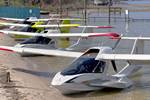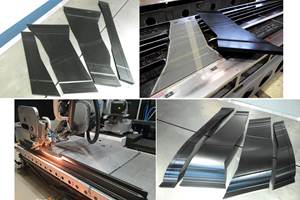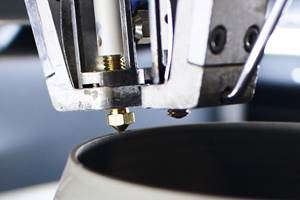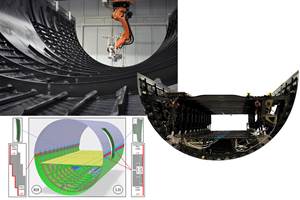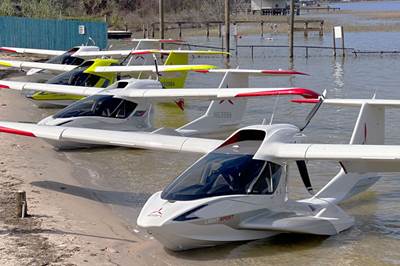Jekta begins flight testing of scaled PHA-ZE 100 amphibious aircraft
Trials of 1:9 scaled composite prototype marks new milestones in the program’s development, including plans to introduce the new aircraft globally in 2030.
Jekta Switzerland S.A. (Payerne, Switzerland), the company behind the passenger hydro aircraft –zero emissions 100 (PHA-ZE 100) amphibious aircraft, has begun flight trials with a 1:9 scaled prototype. Using a distributed electric powerplant to draw energy from onboard batteries, testing will verify the aerodynamic and hydrodynamic configurations of the production aircraft. The remotely controlled model will generate data representative of the full-size aircraft to verify and confirm the results of computational modeling already completed.
Following on from digital simulations, real-world testing is expected to deliver valuable data on how the aircraft performs during landing, taxiing and takeoff from water. To optimize the full potential of flight testing, the 1:9 aerodynamic prototype will be used for initial verification work. Two amphibious flying boats are currently being modified as proof-of-concept aircraft and will be used subsequently to validate the combined digital and real-world data. The purpose-built, ultra-light test beds will further de-risk the program and inform detailed design modifications ahead of full-scale prototype construction.
“After extensive virtual trials and simulations, our engineers are excited to begin flying the 1:9 prototype. The flight testing marks an important milestone on our journey to bring next-generation electric amphibious aircraft to operators globally,” says CEO and co-founder George Alafinov. “Flying the scaled models and modified ultra-lights moves Jekta one step closer to flying a full-scale prototype of the PHA-ZE 100, confirming that we’re on track with plans to introduce our new aircraft to the global air transport network in 2030. Testing presents an excellent opportunity for us to showcase progress to date and the future potential of the PHA-ZE 100 to investors and customers.”
Flight testing is taking place at an undisclosed location and is scheduled to be completed in September 2025. Jekta’s team has already gained extensive experience with amphibious aircraft design through the production of more than 90 single-engine ultra-light and twin-engine flying boats. Alafinov adds, “We are drawing on years of amphibious aircraft experience by basing our full-size test beds on ultra-light aircraft of our design. That experience means our customers can be confident that the PHA-ZE 100 is built on solid foundations by engineers who understand how to trial the real-world application of amphibious aircraft design successfully.”
The Jekta PHA-ZE 100 already has more than $1 billion of forward commitments from customers and is scheduled to begin production at its Payerne facility in 2028/2029.
Related Content
3D-printed CFRP tools for serial production of composite landing flaps
GKN Aerospace Munich and CEAD develop printed tooling with short and continuous fiber that reduces cost and increases sustainability for composites production.
Read MoreA new era for ceramic matrix composites
CMC is expanding, with new fiber production in Europe, faster processes and higher temperature materials enabling applications for industry, hypersonics and New Space.
Read MorePlant tour: Aernnova Composites, Toledo and Illescas, Spain
RTM and ATL/AFP high-rate production sites feature this composites and engineering leader’s continued push for excellence and innovation for future airframes.
Read MoreManufacturing the MFFD thermoplastic composite fuselage
Demonstrator’s upper, lower shells and assembly prove materials and new processes for lighter, cheaper and more sustainable high-rate future aircraft.
Read MoreRead Next
Icon Aircraft is granted FAA type certification for A5
Icon is poised to enter a new phase of growth and market presence outside of the U.S. with its amphibious light sport aircraft.
Read MoreJekta Switzerland unveils composites-intensive 19-seat seaplane design
Jekta says its PHA-ZE 100 amphibious aircraft could revive the economy of coastal and island states while significantly reducing greenhouse gas emissions.
Read MoreAll-recycled, needle-punched nonwoven CFRP slashes carbon footprint of Formula 2 seat
Dallara and Tenowo collaborate to produce a race-ready Formula 2 seat using recycled carbon fiber, reducing CO2 emissions by 97.5% compared to virgin materials.
Read More

